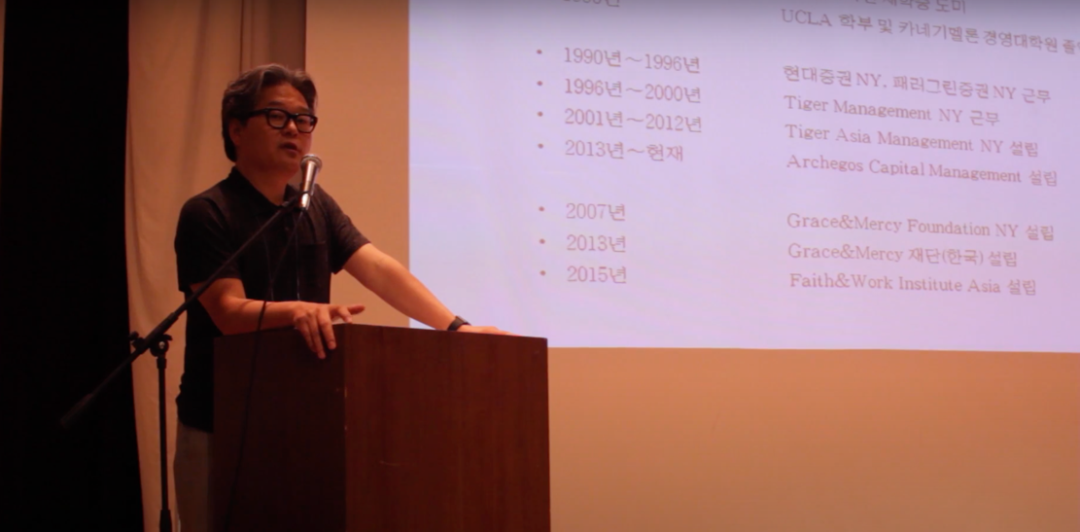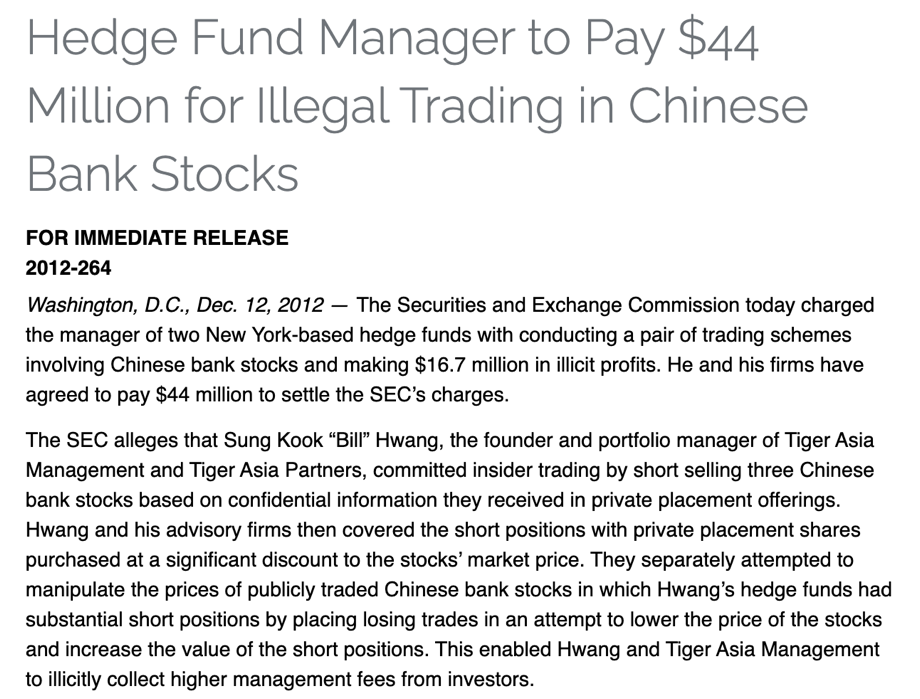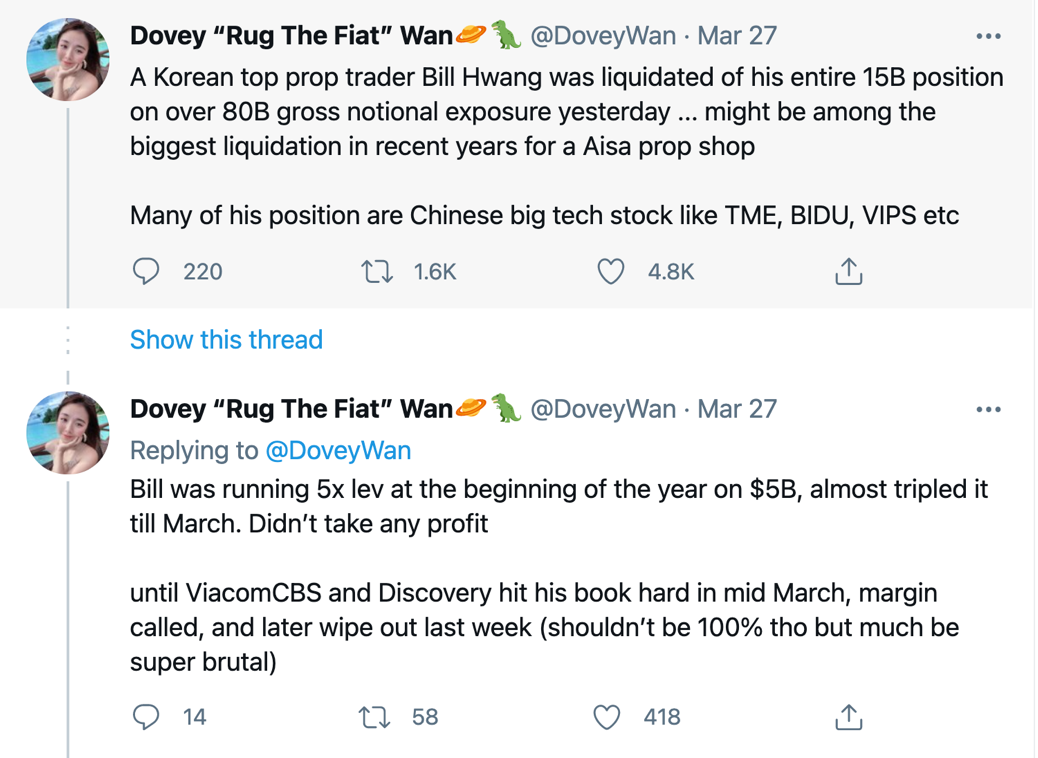Adventure under 5 times leverage.
Editor’s note: This article is from the micro-channel public number “Prism” (ID: lengjing_qqfinance), Author: Wang Fan, Editor: Yang pudding, Publisher: Prism * Tencent News Xiaoman studio.
On March 28, 2021, Nomura Holding Company issued an announcement stating that the US branch may cause a loss of US$2 billion due to a transaction with a US customer. Taking into account the closing of trades and market price fluctuations, the magnitude of the loss may be further adjusted, but the customer’s name was not disclosed.
Reuters quoted people familiar with the matter as saying that the client was Archegos Capital, a family office in New York. According to the “Wall Street Journal” report, last Friday, due to the liquidation of Archegos Capital, the popular groups in China including Baidu and Tencent Music plummeted, and the total sales volume was close to 30 billion US dollars.
On the same day, Credit Suisse also stated that due to a margin default by one of its hedge funds in the United States last week, it may have a “significant impact” on its financials in the first quarter.
Although Nomura stated that as of December 2020, Nomura’s comprehensive common stock Tier 1 capital ratio has remained unchanged at over 17%, which is much higher than the minimum regulatory requirements and will not cause financial management problems. The stock price in the market still plummeted by more than 15%. Market participants worry about whether Nomura’s huge losses will trigger a domino effect in global capital markets.
In the panic of the popular Chinese concept stocks plummeting and Nomura’s huge losses, Archegos Capital manager and Korean investment manager Bill Huang (Sung Kook “Bill” Hwang) once again returned to the public eye.
Who is Bill Huang? How did he earn his first pot of gold, and how did he trigger a storm of individual stocks plummeting?
Someone who has dealt with Bill Huang told the author that his style is firm and direct. “During the road show, I said straight to my boss, “Welcome to New York, please help me make some money.”
From not being able to speak English to managing a US$5 billion “tiger”
Bill Huang
The “Prism” comprehensive information from foreign media shows that Bill Huang was born in a Korean pastor’s family and went to study in the United States as an adult. It is said that he did not speak English well at the time.
After studying at the University of California at Berkeley to get a degree in economics, and then get a cardAfter Nike Mellon’s MBA, Bill Huang got a job in Hyundai Securities, and therefore got acquainted with Julian Robertson, founder of the Tiger Fund.
Julian Robertson founded the Tiger Fund with 8 million U.S. dollars in the 1980s. Later, in 1998, the fund management scale rose to 20 billion U.S. dollars, becoming one of the world’s largest hedge funds in the 1990s. In 1985, Tiger Fund stepped on the end of the appreciation trend of the U.S. dollar against European currencies and the yen, shorted the U.S. dollar, and bought a large amount of call options on the yen and European currencies. From 1980 to 1986, it achieved an average return of 43%. The return is over 850%. Bill Huang joined Tiger in the 1980s and managed equity transactions in the Korean market.
In 2000, Tiger Fund, which was at its peak, suffered a crash in technology stocks and then mistakenly bet the yen to depreciate against the U.S. dollar, which led to a wave of redemptions by investors, and Tiger eventually closed its doors. After Julian Robertson liquidated the fund, he invested his own funds in the form of seed funds to 38 “disciples” for management. Therefore, these extended new funds are also called “tigers”.
Bill Huang is also one of the “tigers”. With the help of Julian’s multi-million dollar seed fund and his own funds, he founded Tiger Asia Management in New York in 2001. Tiger Asia, which focuses on investment opportunities in Asia, has inherited the style of the Tiger Fund that year to a certain extent. In 2007, the Tiger Asia Fund’s return rate was 55%. From its inception to 2007, its annualized rate of return was as high as 40.4% during the 7-year period. At its peak, Tiger Asia once managed more than US$5 billion in funds.
Involved in insider trading fined $44 million
It was announced on the SEC website that on December 12, 2012, Bill Huang was fined $44 million for involvement in insider trading
But Tiger Asia took another path because Bill Huang was involved in insider trading.
On December 12, 2012, the US Securities Regulatory Commission announced that Bill Huang, the founder of Tiger Asia, admitted that insider trading was profitable and issued a fine of $44 million.
“Prism” inquired about the US Securities Regulatory Commission’s documents. From 2008 to 2009, Bank of China (03988.HK) and China Construction Bank (00939.HK) conducted a total of three private placements to investors. Tiger AsiaAfter obtaining information from the allotment investment bank, they all sold the shares of Sky Bank and China Construction Bank before the allotment, and then made up the short positions at a low price when participating in the allotment, thereby making an illegal profit of 16.7 million US dollars.
This is in violation of agreements with large investment banks, which stipulate that Tiger Asia shall not use information to trade related stocks while participating in the allocation of funds. At that time, the head of the Enforcement Department of the US Securities Regulatory Commission once said, “Bill Huang should learn from the lesson that illegal offshore transactions are not outside the jurisdiction of US law enforcement.”
In addition to the US Securities Regulatory Commission, the Hong Kong Securities Regulatory Commission also prohibits Tiger Asia from engaging in any listed securities and derivative transactions in Hong Kong, China within 4 years. Tiger Asia also refunded external funds and turned it into a family office.
“I am not afraid of death or money”
After being fined for insider trading, Bill Huang seemed to work harder to find strength in faith.
He rarely shows up in public to discuss investment ideas. The few public records show that he has since started to talk about the relationship between religion and investment. He will invite church members to read the Bible together in his office in Times Square, New York, and he will talk about faith openly and remind himself to reflect: “When you succeed, many people say hello, and then slowly you will Forget who you are and who God is. When you feel that everything is under control, you may have been very wrong. Therefore, we must have the concept of’home’ and’reflection’.”
But he also said at the same time that because of his faith, he has no fear, “I am not afraid of death, nor money.” His family office is called Archegos, which also has a religious meaning, and is called “Forerunner” in Greek.
The huge risk under 5 times leverage
And Bill Huang, who manages the family office, seems to continue to maintain the aggressive style of the Tiger Fund. Former Danhua Capital Managing Director Wan Hui tweeted on March 27 that Bill Huang used 5 times leverage to manage US$5 billion at the beginning of this year. It has tripled in March, but it has not been lost. For security.
According to the “Financial Times”, a person familiar with the matter said that early last week, Viacom Group announced the issuance of US$3 billion in common stock and convertible bonds. He was severely hit, and finally unable to make a margin call, he had to liquidate all his assets. “The Wall Street Journal” estimates that the liquidation of the fund led to a $30 billion sell-off on Friday.
“As Wellcome and Discovery plummeted in mid-March, they hit the liquidation line, resulting in a US$15 billion worth of stock positions being forced to liquidate by investment banks. His holdings include many popular stocks in China, such as Baidu and Weibo. Pinhui, Tencent Music, etc.” Wan Hui said on social media.
Former Danhua Capital Managing Director Wan Hui revealed relevant information about Bill Huang on Twitter
The Tiger Fund, which was at its peak, created a myth from 8 million to 20 billion U.S. dollars, and it also suffered a bleak redemption by investors. Even talented investors will have moments of overturning in the market. “Money is a good servant and an evil master.” Bill Huang once said in a public speech.
After Nomura and UBS successively warned about the risk of huge losses, people are also re-examining the unknown risks hidden in the market.
Because of using stock swaps to increase leverage, Bill Huang was able to avoid the red tape of the US Securities Regulatory Commission, but it also contained huge risks. Swap contracts are signed by Wall Street investment banks and customers. The users bear the profit and loss of the stock portfolio and the bank receives commission income. In this way, customers do not need to disclose their positions to the Securities Regulatory Commission, and achieve the effect of being invisible in the market, even if some positions may exceed 10% of the placard line.
“How can a fund with such a large risk exposure have almost no record in the SEC?” wrote a Forbes commentator. After Archegos, market participants are also worried that more highly leveraged funds will appear “naked” in this round of market turmoil, and trigger a stampede effect in US stocks.


